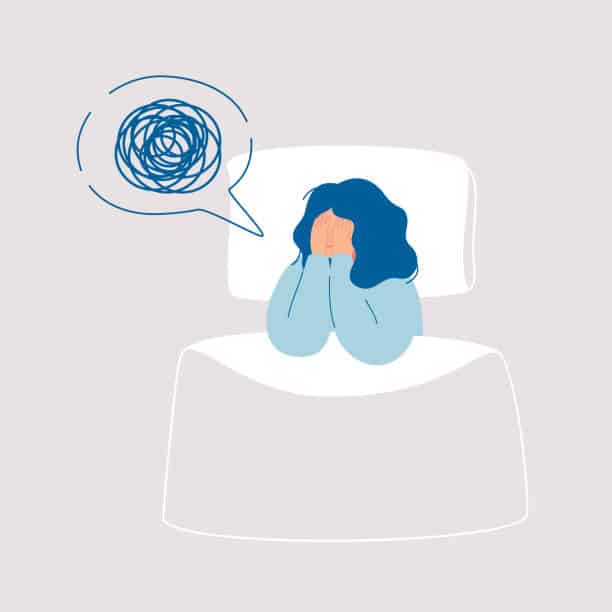In 2016, the number of people estimated to be suffering from mental health issues like depression and anxiety amounted to roughly 1.1 billion. Since then, numbers have likely continued to rise. Moreover, studies have also shown women especially on average are a) more likely to suffer from mental health issues, and b) less likely to talk about them. The taboo in Pakistan surrounding depression and anxiety disorders only serve to aggravate the individuals suffering even more. For the women who cannot seek out full time therapy, we’ve enlisted the help of a trained therapist. You sent us in your questions – here are the answers!

‘I have been facing sleep paralysis and depression for quite some time. I don’t even know anymore which came first. I know it’s all because of my past experiences but even though I want to move on, I can’t. Please help me – what can I do?’

Shahrukh’s Response:
Dear Anon,
When it comes to past experiences, especially those of a distressing nature, our minds might forget, but our bodies will remember and those unprocessed experiences can manifest in the form of physical symptoms. In the long run, these old memories can also have an impact on the brain and can cause it to remain in a state of hypervigilance, have affect cognitive functioning and could lead to memory loss and one’s ability to focus. These events can also lead to long-term mental health issues such as anxiety, depression, ADHD, eating disorders and so on. Sleep paralysis could be the result of past memories, as well as poor sleep hygiene. Let’s look at both issues and see how we can help you out!
Sleep Paralysis: What Is Going On?
Sleep paralysis is a brief loss of muscle control. People who have experienced it have reported a feeling of weight on the chest, hallucinations of someone else being present in the room or even out of body experiences. When it comes to sleep paralysis, the general belief is that it is mostly related to one’s sleep hygiene. Here are some steps you can take to improve your sleep, which should essentially decrease the frequency of your sleep paralysis episodes.
- Make sure you eat your last meal of the day at least 4 hours before you sleep: you want your body to be as calm and quiet before you sleep – having your body digesting food can make it difficult to fall asleep.
- Routine is essential: try to make sure that you’re sleeping at the same time every night.
- Avoid caffeine before bed: the rule is to generally avoid caffeine after 5 PM. If you’re as sensitive to caffeine as I am, maybe even 4 PM.
- Minimal Light: try to keep your room as dark as possible, or if you’re afraid of complete darkness, you could keep a night light on, preferably somewhere away from your bed so that the light isn’t glaring at you!
- Stay away from screens: put your phone, laptop and tablet away before bed. Maybe opt for a book instead before you go to bed
- Make sure your room is nice and cool: the optimal temperature for sleeping is between 18-20 (Celsius) – so get your room nice and cold, spray from lavender pillow mist on your sheets and pillow and get into bed!
If you are having trouble sleeping, and you feel that the issue might be a little more complex, it is recommended that you explore this further in therapy, and look at this pattern as closely as possible.

The Unresolved Past: How Does It Impact Us?
When we look at trauma as a whole, there are different elements to it, more specifically, the mind and body connection. Lately, a large body of research and literature has suggested that the work for unresolved trauma lies in body work, as well the mind’s cognitions, so it’s important to look at both aspects, rather than just one. Here are some approaches you can look at when working with trauma:
- EMDR: Eye Movement Desensitisation and Reprocessing (EMDR) is said to be one of the leading treatments of unprocessed trauma. It uses rapid eye movements in order to unlock some of that trauma that has been trapped in the brain, and help you process it. Essentially, the treatment is meant to help you process old trauma so that it doesn’t resurface as a trigger in the present. This kind of treatment is effective for PTSD, anxiety, depression, negative core beliefs and so on!
- TRE: Tension and Trauma Release exercises are designed to work primarily with the body. The exercises are designed to activate the body’s natural tremor response, and essentially help you “shake out” any deeply held stress, tension or trauma. It incorporates principles of yoga, mindfulness and meditation, where there is focus on the body and staying with whatever is coming up within the body in the present, and focuses less on the story or narrative. This works best for anxiety and trauma!
- CBT: Cognitive Behavior Therapy is a form of therapy that focuses primarily on thoughts, feelings and behaviours. As we grow older, distressing and/or traumatic events can leave us with negative core beliefs and un-resourceful patterns. A therapist/mental health practitioner who works with CBT will focus on helping the client develop healthier patterns of thinking, and helping them reframe negative thinking patterns – this kind of therapy works great for anxiety and depression!
- Talk Therapy: this kind of therapy is more open-ended – it focuses on working with individuals as a whole rather than specific issues. Depending on the approach, the therapist will use different techniques, empathy, unconditional positive regard and genuineness to help the client navigate their feelings, and guide them towards self-actualisation and a more meaningful, fulfilled life.
Anon, I know it can be really difficult to live with depression, and experience episodes of sleep paralysis. It is important to explore the patterns as much as you can in therapy, especially if you feel like it’s really impacting your day-to-day life. I hope that you were able to find the answers that you were looking for in this article. I wish you all the best on your journey towards healing. Good luck and stay in your power!

The above article is written by Shahrukh Shahbaz Malik who is trained in humanistic integrative counselling at CPDD in the UK and currently has her own private practice in Karachi. The views expressed in this article are those of one expert. They do not necessarily represent the views of Mashion, nor do they represent the complete picture of the topic at hand. This article is for informational purposes only and is not a substitute for medical diagnosis, treatment or therapy.








What do you think?
You must be logged in to post a comment.